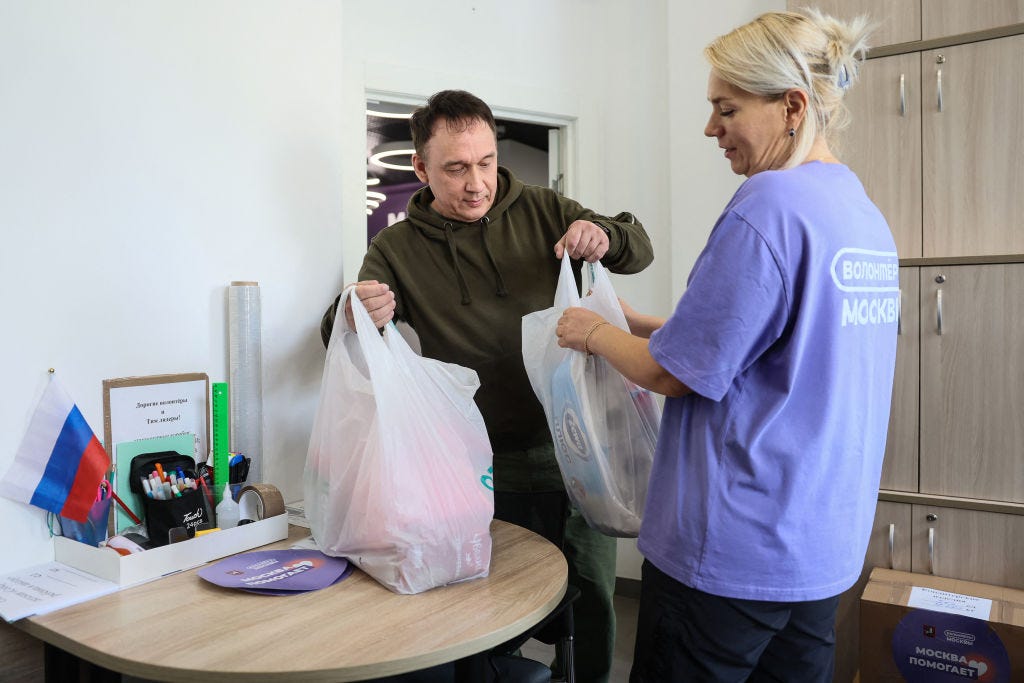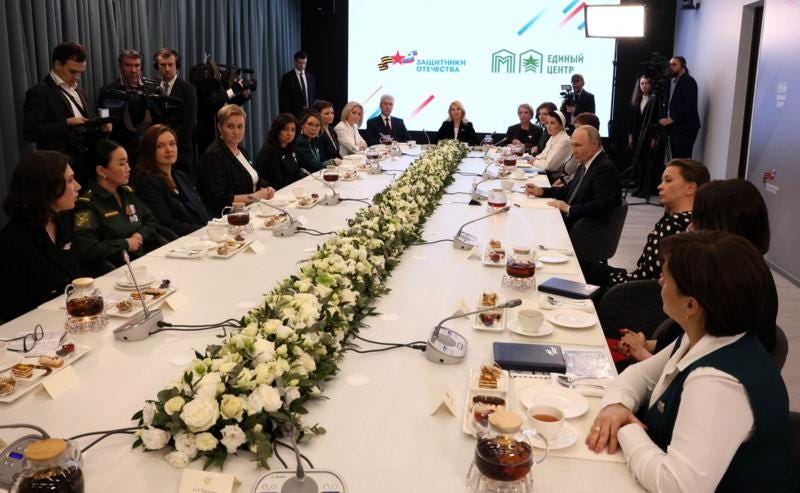How Russian criminals are evading justice by donating to the war in Ukraine
Lawyers voice concern as Russian courts reduce punishments or drop charges against defendants who donate to military causes.
By Elizaveta Fokht.

Increasing numbers of Russians accused of non-violent crimes are evading justice by making donations to support the war in Ukraine. The BBC has uncovered numerous cases across the country involving everything from poaching to corruption. Lawyers say as a result some court processes are becoming meaningless, raising questions about the longer-term integrity of the justice system in Russia.
On a September evening in 2024, Sergei Khamnuev, from Buryatia, set out on a fishing expedition on Lake Baikal. His aim was to catch omul — a prized fish native to the Baikal region. Omul fishing is strictly regulated in Russia and completely banned during the spawning season in September.
Despite knowing all this, Khamnuev went ahead and caught 12 fish. The police were waiting for him when he returned to shore and he admitted his guilt on the spot. The damage caused by his illegal fishing was estimated at 87,000 roubles (just over $1000), which he paid voluntarily. However, this did not save him from prosecution.
In November 2024, a magistrate's court in Severobaikalsk found Khamnuev guilty of poaching, under (Article 256 of the Criminal Code) and sentenced him to a suspended sentence with corrective labour. He was required to register with the parole office and report in every two months. The court also ordered the confiscation of his fishing boat and the destruction of the seized omul.
Khamnuev decided to challenge the decision, and in December 2024, the Severobaikalsk City Court reviewed his appeal. Unlike the magistrate's court, it found grounds not just to reduce the punishment but to release Khamnuev from liability altogether. The court took into consideration the fact that he had cooperated with the investigation and paid the required damages, but there was also one additional factor in his favour: a donation to a local charity raising funds for the war in Ukraine.
The ‘We Are Together’ fund, which is based in Severobaikalsk, supports Russia’s war effort by collecting humanitarian aid for the frontline and for hospitals, as well as helping to buy drones, electronic warfare equipment, and other military kit. Khamuev’s donation appears to have been made just before his appeal, and it was clearly a contributory factor in the court’s subsequent decision to close the case against him, on the basis that he had shown “active repentance”.

Sergei Khamnuev’s case is just one of many uncovered by BBC Russian over the past three years, in which donations to charities supporting Russia’s war effort have been cited as a mitigating factor, often resulting in more lenient judgements.
Since February 2022, we have reported widely on the way that people convicted of, or charged with serious and violent crimes like murder have been able to get out of jail early or avoid prosecution and prison altogether by volunteering to fight in Ukraine. The Criminal Code has been amended in order to allow this to happen.
The cases we have now identified usually involve less serious crimes, but we have found that in many cases even relatively small donations to support the military operation in Ukraine have led to reduced sentences, or to defendants avoiding prosecution altogether.
The BBC spoke to several lawyers working in Russia (all of whom agreed to speak only on condition of anonymity for security reasons). They confirmed that donations to support the war have now become a widespread practice.
They told us that Russia’s Criminal Code allows first-time offenders who have committed minor or moderate crimes to be released from liability under certain conditions—either due to their "active repentance" or through the substitution of punishment with a judicial fine in cases of "damage compensation" or "harm redress".
According to the lawyers, defendants frequently use evidence of donations to the war effort in cases where it is unclear how to assess and compensate for damages.
"Take traffic accidents, for example — if you hit someone with your car and they break a leg, you need to compensate them directly for the harm caused,” one lawyer told the BBC.
“But in other cases, there may be no clear victim—such as planning for or attempting to commit a crime. Or in cases where the prosecution argues that public order has been harmed, saying that damage has been done to societal relations. In those situations, people look for ways to show remorse. And so they donate — to a leukaemia treatment fund, for instance. Or for prosthetics for veterans of the special military operation."
One lawyer told the BBC that donating to the war effort is now seen as a form of "socially approved, positive post-criminal behaviour." In his own practice, he has handled many cases where clients made donations related to the war — including military deserters charged with abandoning their units and defendants in bribery and corruption cases. The amounts donated vary, but he said anything above 10,000 roubles ($120), was likely to be taken into consideration.
Even before the full-scale invasion of Ukraine, charitable donations were often used as a way for defendants to show ‘repentance’ or provide compensation, another lawyer told us. For example in drugs possession cases, defendants would donate to organisations working on drug addiction.

Since the start of the war, many defence lawyers have looked again at this practice and suggested to their clients that donating to a charity connected to the ‘special military operation’ might now help judges to look on them more favourably.
"It doesn’t feel like there was any top-down directive, but this option is definitely better received by judges," another lawyer told us. "There’s a general understanding that this is the trend right now, and donating to the special military operation is more likely to work than, say, donating to an animal shelter."
Because the law does not explicitly define what qualifies as "harm redress," judicial practice largely sets the precedent, another BBC source explained.
"People pay attention to what works in court and what doesn’t. And they often choose the option that has the highest chance of success."
"Better to try than not to try," another lawyer explained to the BBC, describing the logic behind these donations. "And the SVO [BBC: the war in Ukraine] is the simplest and most obvious option right now because there’s a war going on. Some people stand their ground and rot in prison, while others try to minimize the consequences—and in some cases, they get a lighter sentence. I stopped judging people for that a long time ago."
But is it ethical for a lawyer to advise a client to donate to the war effort, we asked. The BBC’s sources had different opinions.
"A defence attorney must present their client with all the legal mechanisms that can help them avoid punishment or mitigate their situation," said one lawyer. "From the perspective of legal ethics, we have to provide the full list of options, and then the person makes their own choice."
He added that in his own practice, some clients have explicitly stated that they were unwilling to donate to the war and instead preferred to contribute to charities supporting children in difficult situations.
Another lawyer said he "could never bring himself" to suggest donating to the war effort.
"In cases where there are no direct victims—meaning no-one to compensate for damages — but where it’s necessary to show that harm to society has been redressed, I suggest donating to orphanages or organizations working with troubled children. But not to the SVO," he said.
Corruption to document fraud
By studying court records from across the country, BBC Russian has identified a wide range of different crimes from corruption of document fraud, where Russians have avoided prosecution by making donations to military causes.
In Chelyabinsk region in the spring of 2023, a local council official called Galina Fedoseeva, was charged with abuse of power (Article 286 of the Criminal Code) for unilaterally awarding herself bonuses totalling 200,000 roubles ($2400) between 2016 and 2020.
Fedoseeva admitted her guilt and paid back the money. Additionally, she presented the court with receipts showing that she had donated 20,000 roubles ($240) to the BARS ‘Kaskad’ battalion—an elite unit specializing in aerial reconnaissance, which included several State Duma deputies among its ranks. She also sent a little over 5,000 roubles ($60) "to the special operation zone".
The court dismissed the criminal case and imposed a judicial fine of just 10,000 roubles ($120). The prosecution was outraged by this decision, but both the appeal and cassation courts ultimately sided with Fedoseeva, ruling that she had atoned for her wrongdoing. Her donations to the war effort were specifically highlighted in the rulings.
In Sevastopol last autumn, donations to the front helped Yanа Bukatar, a clerk at a local employment agency for sailors, to avoid punishment. According to the investigation, Bukatar provided her clients with fake paperwork so they could get medical examination certificates to work at sea, without having undergone a medical. Bukatar was charged with document forgery (Article 327 of the Criminal Code).
At the trial, Bukatar expressed sincere remorse for her actions and claimed she had rectified the harm she had caused. This included donating more than 15,000 roubles ($180) to soldiers fighting in Ukraine and to frontline hospitals in the combat zone. She also donated a smaller amount to help a local orphanage. The court decided that this was enough to impose a fine and close the criminal case.
We have also found cases where donations to the war effort have helped when more serious crimes have been committed. In late 2022, Aleksandr Kazakov, from Krasnodar region, was driving on the main road between Sochi and Tuapse with his partner. At some point, while driving at speed, he lost control of the car and crashed into a parked truck on the opposite side of the road. His partner was killed.
In November 2023, Kazakov, who fully admitted his guilt, was sentenced to two years compulsory labour in a special correctional centre. He appealed and his lawyer presented two main arguments for leniency – one that he was caring for his elderly mother and the family of his dead partner. And secondly that he had found a "mechanism for restoring society's violated interests” by donating to the "special military operation aid fund".
The court agreed with these arguments and reduced the sentence, although it did not completely free Kazakov from criminal responsibility. Instead of compulsory labour, he was fined 100,000 roubles ($1200) and had his driving license revoked for a year.
But donations to the war effort do not always guarantee the dismissal of a criminal case or even a reduction in punishment. Even in cases with similar charges, the outcomes can differ greatly.
Discretion and political will
While Sergei Khamnuev, the omul poacher from Buryatia succeeding in getting the charges against him dropped. We also found a very similar case in the Far East involving a hunter who shot dead two rare deer on the endangered species list. The outcome here was very different, and although the defendant raised the issue of his donations to military causes, he still received a suspended jail sentence.
According to lawyers familiar with such cases, it is impossible to predict in advance how a donation will affect the outcome of a trial.
"It all depends on the judge’s discretion and political will," one lawyer explained.
The BBC found one ruling in which the judge clearly very carefully considered whether financial support for the war could be seen as compensating for harm to the state and decided that it didn’t.
In January 2025 in the city of Volzhsky in Volgograd region, a local man named Tokarev, was accused of paying a local hospital worker to issue him with a fake sick note.
“Unfortunately, legal mechanisms have outlived their usefulness, and many court processes now resemble rituals more than real justice"
Tokarev admitted his guilt and attempted to make amends, including by "organizing humanitarian aid for the residents of Donbas and participants of the special military operation". However, the court did not consider the donation sufficient to mitigate the punishment.
The court's ruling noted that financial support for the front "does not reduce the public danger" of the crime of corruption and does not compensate for the harm caused to "the state and society." The assistance to the front was regarded merely as a "circumstance" that characterizes the defendant's personality. Ultimately, Tokarev was sentenced to 7 months of restricted freedom.
Although donations to good causes have always played some part in influencing sentencing decisions by some judges, it’s clear that the widespread use of donations to the war effort as a mitigating factor, has left some lawyers seriously losing faith in the integrity of the justice system in Russia.
Donations used to be “a mechanism to help create a positive image in the eyes of a judge”, one lawyer told us, but they are now becoming no more than ‘decorative symbolism’ in an increasingly meaningless system.
“Unfortunately, legal mechanisms have outlived their usefulness, and many court processes now resemble rituals more than real justice," the lawyer said.
Read this story in Russian here.
Russian version edited by Anastasia Lotareva
The Russian authorities have designated Elizaveta Fokht and Anastasia Lotareva as "foreign agents." The BBC categorically opposes this decision and is appealing it.
English version edited by Jenny Norton.






